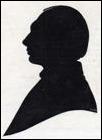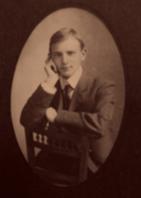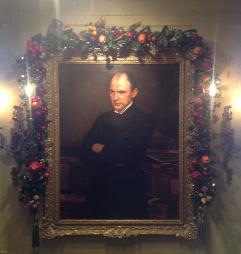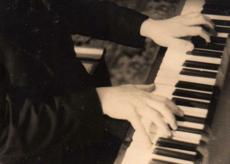 |  | ||||||
Home Page | Leonard Rayner | Michael Winwood | Information & Testimonials | Examinations & Concerts | Contact Us | |||||||
LEONARD RAYNER - MASTER PIANIST AND TEACHER Background & Education Leonard Rayner was born in 1885 in Birmingham. He was the eldest son of Charles Henry & Elizabeth Rayner. His father was a successful retail businessman in the area, co founder of Welch & Rayners, the soft furnishings and furniture emporium on the High Street, Smethwick. Leonard had been educated at Holly Lodge Boys Grammar School and excelled himself in music, languages and mathematics. Even as a very young man his remarkable facility at playing the piano had been noted. After initial studies at the Birmingham School of Music, Leonard went on to the Royal Academy of Music in London, where he had the singular fortune to be taught by Benno Schonberger, who himself had been a particularly favoured pupil of Franz Liszt - certainly the greatest pianist & teacher of the 19th century and also the noted teacher of piano technique Tobias Matthay. Liszt thought highly of Schonberger's playing, particularly the beauty and elegance of his touch. The artistic sensitivity of his playing was cultivated by the Master over many years study at Leipzig. His insight into the beauty of great music and its performance through the cultivation of many different 'voices' and colours of sound was the study which he inspirationally passed on to his students at the turn of the 20th century. The gifted Leonard Rayner was fortunate indeed in such a teacher of the Liszt school. This good fortune extended further, for, while at the Royal Academy he was also taught the analysis of piano technique by the renowned theorist Tobias Matthay. He was certainly the first scholar to analyse every aspect of 'touch' and to systematise its understanding and teaching. | ||||
 | ||||
 | ||||
A Career on the Concert Platform Leonard returned to Birmingham where, in 1913, he began his concert career with a piano recital at Birmingham Town Hall. He continued to perform in all the major cities of the country (and indeed in many smaller towns in the midlands) where his playing was universally hailed for its beauty, delicacy, elegance and musical integrity. The London Observer wrote in 1922 ' Do people know that we now have in this country a distinct school of our own piano playing? And is it realised what fine playing this school is giving us? We now have players whose work is far more genuinely pleasurable that any of the great foreign pianists who have so far returned to us. The great executive and interpretative genius of Leonard Rayner has assured him a place as ”One of the most gifted of our English pianists”'. Other critics said he was 'in the company of the master musicians of the ages', And he was at the time described as 'the English Pachmann'. His beautiful touch, thrilling technique and deep musical integrity are all widely commented upon. The testimonies of the critics seem endless. The praises heaped upon his performances may seem remarkable to our ears now, but the writer can say that he has heard a number of live testimonies, (even to the end of the 20th century) from people who recall a Leonard Rayner recital of some 50 or 60 years ago with vivid appreciation of the beauty of his playing. It has | ||||
also been repeatedly asserted that seldom had the listeners heard his equal, even amongst the famous names of international pianists of the intervening decades. That the name of Leonard Rayner did not become more widely known is largely because he simply refused to make recordings, though he had been offered contracts by the BBC and others from the earliest days of his career. In fairness to his memory, it should remembered that the recording quality of those early days was fairly crude - a poor representation of the beauty of live sound. Leonard retained all his life a dislike of recording and the over amplification of musical sound. He was of the opinion that the live musical experience was everything - the interaction of the concert audience and the soloist is the whole point of playing. It is, however, greatly to our loss that we in posterity have no chance to hear even a distorted echo of such memorable & sublime performances. His concert career ended in 1939, concluding his final tour with a concert in Birmingham, where his public playing had begun 26 year earlier. Founding the Music School As an adjunct to his musical work and training he founded the Leonard Rayner Piano School in the year 1934. He was a natural teacher; generous, spirited and patient. A man who had deeply considered music, he perceived the refinement of art through instinct as well as training. By many who knew him, and by all who had the privilege to study under him, he was noted as a person of striking and arresting character. Perhaps in appearance rather majesterial in the Liszt style (still wearing even in the 1960s a manner of artist dress of the 1890s - in black, with beret and full length cloak and the black silk jabeau tied loosely at the throat, a truly remarkable vision in post war Birmingham!). Yet behind this extraordinary image was a man of great kindness, wisdom and intelligence, shot through with a lively wit and glorious sense of humour - a person who was both profound and full of fun and charm. For these reasons he was surrounded, for much of his professional life, by good friends, admirers and disciples. It was from this circle that the staff of the Music School was formed, and at its height it boasted studios in London, Birmingham, Coventry, Wolverhampton & Walsall. The centre of the school was at the newly refurbished Queens College, in Paradise Street, Birmingham (just opposite the old Town Hall). Here practice rooms echoed with the sounds of piano scales being practised, vocal arpeggios sung, and all manner of instruments being scraped, squeaked and blown! From quite early days the musical work of the school had widened beyond the confines of keyboard work. Some of the assistants such as Ruth Cooke (Leonard's right hand support) took on classes of small children, while Nora Turner cultivated a jolly junior wind band as a sideline from her own wonderful playing and piano teaching. All were inspired teachers. Many fine players were cultivated, some to the concert platform, others into the wider musical profession. Other indifferent players were taken on, taught technique & listening and improved. Some people, who had never thought of playing came along, took it up and discovered, for the first time the joy of music making, to the enrichment of their lives. When Leonard Rayner died in 1963 at the age of 76 it came as a great shock and sorrow to his many friends and pupils and admirers. He had been waiting for the arrival of a pupil at his home in Selwyn Road, Edgbaston, and he was playing through the Liszt B minor Sonata when he suffered a heart attack. He did not recover and died the following morning. Many, many people attended his funeral and a profound sense of loss was expressed by all. Touching obituaries appeared in every newspaper across the region. Ruth Cooke inherited the running of the school, but with the master pianist gone, she took the decision to give up Queens College and moved the school to Selwyn Road, Edgbaston - Leonard's home - a beautiful house in the Arts and Crafts style which he built to his own specification in the 1920s. It was elegantly designed around his music room with a fireplace at either end and his Steinway grand piano by the French windows, looking down the simple garden - a broad avenue of laurel bushes, flanking the lawns, leading down to the extensive waters of the picturesque Edgbaston Reservoir. Here she continued teaching with the same care and rigour, salting her lessons with anecdotes of Leonard's insight and wit. When she died in 1995 the house was unfortunately sold before Michael Winwood, Leonard Rayner's great-nephew (who took over the School in 1990) could buy it back. | ||
 | ||||